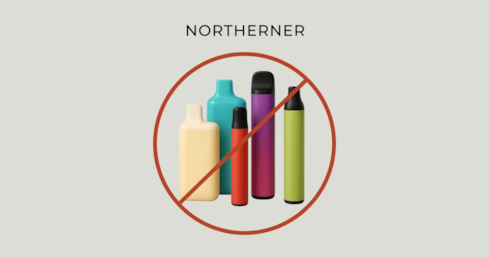The UK Disposable Vape Ban (2025): What You Need to Know

Key Points
- Disposable vapes will be banned in the UK from 1 June 2025
- The ban targets single-use, non-rechargeable, non-refillable vapes
- Refillable kits and nicotine pouches remain legal alternatives
Why Is the UK Banning Disposable Vapes?
On 29 January 2024, the UK Government announced that disposable vapes will be banned under new legislation designed to address both environmental concerns and the rise in youth vaping. The ban will come into force on 1 June 2025.
Disposable vapes are built with plastic shells and lithium batteries, making them difficult to recycle. These components frequently end up in landfills or as litter, raising long-standing concerns among environmental and waste management authorities. Under the Waste Batteries and Accumulators Regulations, batteries must not be sent to landfill and require special handling to avoid environmental harm and fire risk.
In addition to the environmental issues, the ban is supported by public health organisations.
"The UK government announced a ban on disposable vapes to tackle the rise in youth vaping and protect children's health."
Taken together, these concerns prompted UK policymakers to take decisive action – steering the market toward reusable and tobacco-free alternatives.
Which Vape Products Will Be Banned?
The legislation applies specifically to single-use, disposable vape products. These are pre-filled devices that are designed to be discarded entirely after the e-liquid or battery is depleted. Because they are not rechargeable or refillable, they contribute heavily to electronic and plastic waste — a major factor in the government’s decision.
To be clear, this ban does not affect rechargeable or refillable vape devices, which are intended for extended use. Devices that use replaceable pods or tanks, or allow users to refill with e-liquid, will still be legally available for sale in the UK.
Government guidance indicates that the ban will focus on:
- Fully disposable vape kits, including those sold with pre-filled tanks and integrated batteries
- Non-rechargeable single-use vapes that cannot be refilled with e-liquid
The goal is to target products that are used once and thrown away, in contrast to more sustainable alternatives that generate less waste and offer longer lifespans.
What the New Rules Mean
With this new legislation, it will become illegal to sell disposable vape products in the UK from 1 June 2025. This regulatory shift is expected to bring about several changes for vapers and businesses:
- Fewer single-use products in circulation, reducing waste.
- Retailers transitioning towards reusable or alternative nicotine products, such as refillable vape kits and tobacco-free snus, also known as nicotine pouches.
- Greater consumer awareness of nicotine alternatives that align with the UK’s long-term sustainability goals.
Sustainable Alternatives to Disposable Vapes
For those who wish to maintain their nicotine routines whilst reducing environmental impact, there’s a variety of smoke-free alternative. Refillable and rechargeable vape kits are familiar to many experienced users, but several other possibilities can streamline convenience and cost while producing fewer disposable components.
Refillable Vape Kits
Refillable vape kits are increasingly seen as a more sustainable and adaptable option for adult nicotine users following the ban on disposable vapes. These devices typically come with rechargeable batteries and refillable e-liquid tanks, helping to reduce waste and long-term costs.
Many models include adjustable settings such as airflow or power levels, offering users a more customisable vaping experience. Designed with durability in mind, refillable kits support a longer product lifecycle and are often easier to maintain than single-use alternatives. Their reusability makes them a practical choice for those looking to align with the UK’s move toward more environmentally responsible nicotine consumption.
Nicotine Pouches (Tobacco-Free Snus)
Nicotine pouches are another alternative to disposable vapes. As a smokeless format, they do not produce vapour or require batteries, making them a practical choice for those seeking a lower-waste nicotine product.
Explore our nicotine pouch strength guide and nicotine pouch flavour guide to learn more about this discreet and portable option that aligns with more environmentally conscious habits.
Future Eco-Friendly Innovations
Beyond refillable kits and nicotine pouches, some manufacturers are exploring emerging technologies to reduce the environmental impact of nicotine products. These include biodegradable hardware, recyclable packaging, and novel battery designs aimed at improving reusability. While many of these innovations are still in early development, they highlight the industry’s move toward more sustainable alternatives.
Economic Shifts and Social Considerations
Large-scale changes to how disposable products are sold and used can bring both opportunities and challenges. Local entrepreneurs and shop owners who rely on single-use vape sales may face short-term disruption, while others are already exploring product shifts – such as transitioning to refillable vape kits or offering tobacco-free alternatives like nicotine pouches.
At the same time, concerns around underage use remain central to the debate. Regulators hope that banning disposable vapes will reduce youth access. However, some critics argue that enforcement, education, and broader public health strategies will be equally important in addressing the root causes of underage use.
Overall, the new regulations reflect a broader policy direction that prioritises both ecological responsibility and protection of younger populations, as the government looks to shape a more sustainable and controlled nicotine market.
Moving Forward
With the UK’s disposable vape ban now confirmed, many vapers are exploring how to adjust their routines ahead of the changes. By exploring alternatives like refillable vape kits and tobacco-free snus, users can continue their nicotine routines while disposing of fewer components over time. This transition reflects a broader move toward products that balance environmental responsibility with personal choice. For those seeking guidance, local retailers and community forums can offer helpful advice on the transition.
Snus
-
NEAFS NEAFS Mint Fusion 13mg Strong
 10-pack £39.90 £3.99/unit
10-pack £39.90 £3.99/unit -
NEAFS NEAFS Ice Cool 13mg Strong
 10-pack £39.90 £3.99/unit
10-pack £39.90 £3.99/unit -
KILLA KILLA Blueberry Extra Strong
 New10-pack £34.90 £3.49/unit
New10-pack £34.90 £3.49/unit -
KILLA KILLA Frosted Mint Extra Strong
 New10-pack £34.90 £3.49/unit
New10-pack £34.90 £3.49/unit -
KILLA KILLA Mango Ice Extra Strong
 New10-pack £34.90 £3.49/unit
New10-pack £34.90 £3.49/unit -
KILLA KILLA Melon Extra Strong
 New10-pack £34.90 £3.49/unit
New10-pack £34.90 £3.49/unit -
KILLA KILLA Exclusive Blue Mint
 New10-pack £34.90 £3.49/unit
New10-pack £34.90 £3.49/unit -
KILLA KILLA Exclusive Double Mint
 New10-pack £34.90 £3.49/unit
New10-pack £34.90 £3.49/unit
Disposable Vape Ban FAQs
When will disposable vapes be banned in the UK?
From 1 June 2025, it will be illegal to sell disposable vapes in the UK under new government legislation.
Why is the UK banning disposable vapes?
The ban aims to reduce environmental waste from single-use products.
What types of vapes are included in the ban?
The legislation targets single-use, non-rechargeable vapes that cannot be refilled or reused. Refillable and rechargeable devices are not affected.
What are the alternatives to disposable vapes?
Alternatives include refillable vape kits and nicotine pouches (also known as tobacco-free snus).
Can I still buy nicotine products after the ban?
Adult users can continue to access nicotine through legal alternatives such as refillable vapes and tobacco-free nicotine pouches.








